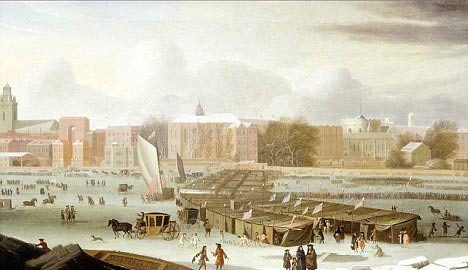当前位置: Language Tips> 双语新闻
|
 A painting, dated 1684, by Abraham Hondius depicts one of many frost fairs on the River Thames during the mini ice age. |
|
The supposed ‘consensus’ on man-made global warming is facing an inconvenient challenge after the release of new temperature data showing the planet has not warmed for the past 15 years. The figures suggest that we could even be heading for a mini ice age to rival the 70-year temperature drop that saw frost fairs held on the Thames in the 17th Century. Based on readings from more than 30,000 measuring stations, the data was issued last week without fanfare by the Met Office and the University of East Anglia Climatic Research Unit. It confirms that the rising trend in world temperatures ended in 1997. Meanwhile, leading climate scientists yesterday told The Mail on Sunday that, after emitting unusually high levels of energy throughout the 20th Century, the sun is now heading towards a ‘grand minimum’ in its output, threatening cold summers, bitter winters and a shortening of the season available for growing food. Solar output goes through 11-year cycles, with high numbers of sunspots seen at their peak. We are now at what should be the peak of what scientists call ‘Cycle 24’ – which is why last week’s solar storm resulted in sightings of the aurora borealis further south than usual. But sunspot numbers are running at less than half those seen during cycle peaks in the 20th Century. Analysis by experts at NASA and the University of Arizona – derived from magnetic-field measurements 120,000 miles beneath the sun’s surface – suggest that Cycle 25, whose peak is due in 2022, will be a great deal weaker still. According to a paper issued last week by the Met Office, there is a 92 percent chance that both Cycle 25 and those taking place in the following decades will be as weak as, or weaker than, the ‘Dalton minimum’ of 1790 to 1830. In this period, named after the meteorologist John Dalton, average temperatures in parts of Europe fell by 2C. However, it is also possible that the new solar energy slump could be as deep as the ‘Maunder minimum’ (after astronomer Edward Maunder), between 1645 and 1715 in the coldest part of the ‘Little Ice Age’ when, as well as the Thames frost fairs, the canals of Holland froze solid. (Read by Lee Hannon. Lee Hannon is a journalist at the China Daily Website.) (Agencies) |
新的温度数据显示,地球在过去的15年间并无变暖。这一数据发布后,人为引起全球变暖的“共识”受到了不利挑战。 数据显示,人类甚至有可能面临小冰河期,堪与17世纪泰晤士河上举行霜降会的70年降温相提并论。 上周,英国气象局和东安格利亚大学气候研究中心悄无声息地发布了这些基于3万多个监测站的数据,确认世界温度上升趋势止于1997年。 昨日主流气候学家对《星期日邮报》称,太阳在整个二十世纪都发出异乎寻常的高能量,现在正走向太阳辐射输出的最低值,人们将面临冷夏、严冬以及粮食种植季节缩短的威胁。 太阳辐射输出完成了十一年的周期,高峰期出现大量的太阳黑子。 我们现在正处于科学家所谓的第24个太阳活动周期的高峰期,这就是为什么上周的太阳风暴导致比平常更偏南的地方出现北极光。但是太阳黑子的数量少于二十世纪的太阳活动周期峰值的一半。 美国宇航局和亚利桑那大学的专家分析,从太阳表面以下12万英里的磁场测量推断,第25个太阳活动周期的高峰期将在2022年,太阳辐射将大大削弱。 据英国气象局上周发布的报告,第25个太阳活动周期以及随后数十年间的太阳辐射,有92%的可能性达到1790年至1830年间的“道尔顿最低点”,甚至更弱。在这段以气象学家约翰•道尔顿命名的时期里,欧洲部分地区的平均温度下降了2摄氏度。 然而,这次新的太阳能量暴跌也可能达到“蒙德最低点”(以天文学家爱德华•蒙德命名)的幅度,即1645年到1715年间“小冰河期”最冷的时候,那时泰晤士河、荷兰运河都冰封冻结。 相关阅读 (中国日报网英语点津 实习生蔡冬梅 编辑:陈丹妮) |
|
Vocabulary: frost fair: 霜降会,在霜降时节举行的规模盛大的物资交流会 fanfare: 号角声,宣传 aurora borealis: 北极光 |
上一篇 : 英国公交司机叫乘客“亲”或被开除
下一篇 : 德国:违章停车开罚单免罚金
电话:8610-84883645
传真:8610-84883500
Email: languagetips@chinadaily.com.cn